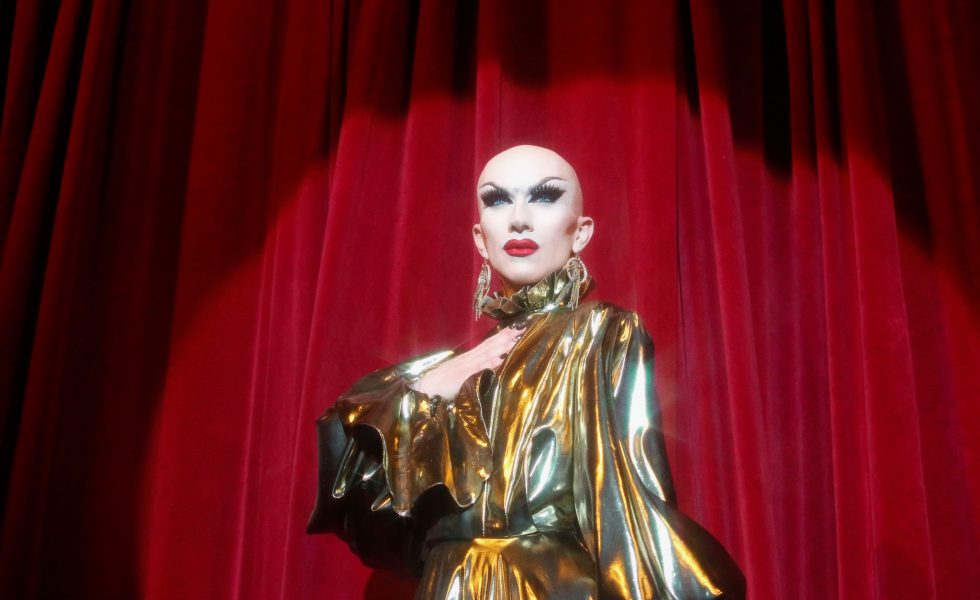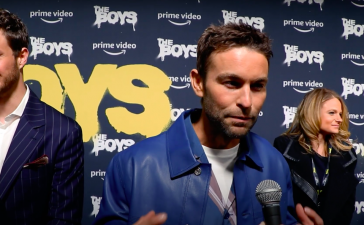“The world is on fire in figurative and literal ways.”
Sasha Velour isn’t going to beat around the bush: it’s tough out there for all of us right now. It turns out that even those of us trying to shield ourselves with idiocy can still contract the coronavirus (see Donald Trump as exhibit A) and fires don’t go out just because we’re in a pandemic that’s burning up our world already. She postfaces that she is feeling optimistic, which is obviously not a default mood given our social and political context. Her focus going into the United States election in November is to continue to touch on the issues that face us – global virus or not.
“I feel a responsibility to tell people to vote,” she asserts. “We have an opportunity to turn things around in November to some degree. And then to also let drag, which could be something light and fun, to let that be a place to reflect on the serious things, to talk about racism in the country, to talk about socioeconomic disparity and food and housing needs.”
Being a drag queen and artist in America of course gives Velour a unique perspective on understanding what can happen when bigots outlay their issues with anyone that’s different. With her NightGowns live show, Velour raises money to contribute to community causes. When the pandemic sidelined that, she used a digital show on YouTube to achieve the same outcome, contributing the funds to black trans organisations.
“Money, actions and conversations really do make a difference,” she points out. “But I also think there’s something utopian about a drag show, and then maybe I use that word a little too much…We have a chance to create our own little space that can function by maybe a better guiding principle, ideas of equality and representation. And so hopefully by showing even ourselves that it’s possible to make things and move forward in a different way, that can trickle down and show other people that it’s possible as well.”
“We have a chance to create our own little space that can function by maybe a better guiding principle, ideas of equality and representation.”
Having won the ninth season of RuPaul’s Drag Race in 2017, Velour has achieved icon status. With NightGowns hitting streaming service Quibi earlier this year, she continues to pioneer a movement embracing diversity, albeit one that attracts sustained backlash from the supremacist assholes that we assume Donald Trump was speaking to when he said “stand back and stand by.”
Velour recounts that people “love to say the most violent and hateful things just because they can and because they’re hiding behind the anonymity of the internet.” While it’s easy to “say just tune it out”, it can be hard in practice. “I think everyone’s a sensitive soul in the world,” she explains. “Even if intellectually you know that it’s coming from someone who could be a little kid somewhere just saying whatever they heard, or someone who’s just trying to fuck with you and upset you and get a reaction, it still sometimes can affect you.”
The solution, at least to Velour, is simply articulated. “When we’re strong together and can have conversations offline with our community about like, ‘everyone goes through this, but we’ve got each other’s back and we’re just going to face it and move forward,’ I think we can be a little stronger. At the beginning when I was on Drag Race I would try to clap back. But eventually I realised that was just labour that I was doing that no one was paying me for. Now, I’m not going to waste my time on that.”
The arts have long been an avenue to channel rebellion against societal norms, especially when those norms aren’t necessarily serving the goal of equality. Unfortunately, elitists aren’t deterred by the name of an industry, though Velour is steadfastly against any limitations being placed on the concept of expressing one’s self. She struggles, like a lot of us, with why pressure to work towards the “traditional way” continues to quell our creativity. Citing her studies on Modern Literature, she adds that what we find in the digital age, from writing online to social media, should be considered part of this corner of our culture.
“Traditional books I think have to get shaken up and respond to the way that we are interacting with words and self-expression now. I feel it’s such an exciting and very multimedia time for literature…I’ve been reading a lot of queer theory, so to speak. I just read this little book by my friend Alok Vaid-Menon. And it was all about how the gender binary is a lie and it spoke to me so deeply. I love that you can get right to the point and mix philosophy and personal experience. And I really related to it because I also think that man and woman are categories that don’t serve people as well as we think, and I think it’s radical and important for people to think outside that.”
As for Velour’s contribution to literature, it’s obvious that she has already done more than enough to make a mark on our culture. At the end of the day, making at least one person’s day better is an achievement in and of itself, but Velour has inspired a community that fosters inclusiveness and diversity with impact many could never have predicted. It follows that any future contribution to our world would be more than we could of asked for. Having said that, she teases that “there might be a book in the near future.”







